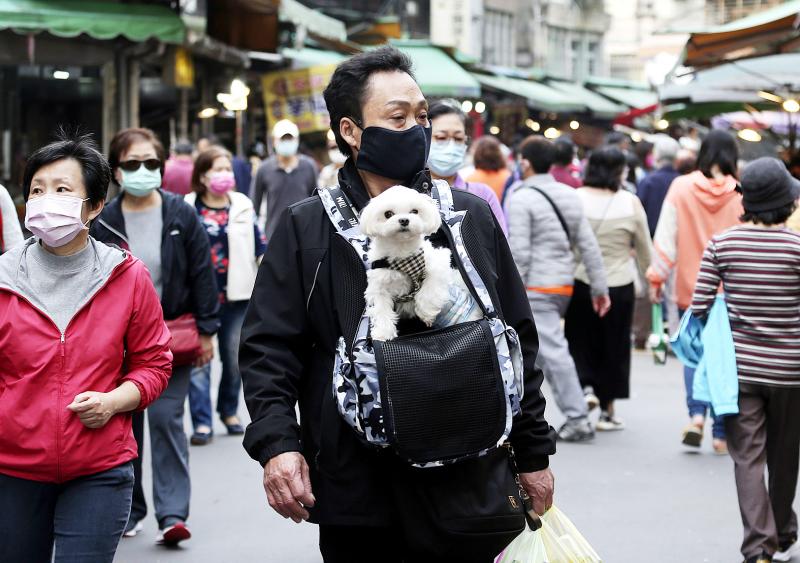The Central Epidemic Command Center (CECC) yesterday confirmed three new imported cases of COVID-19, arrivals from Canada, the US and Poland, bringing Taiwan’s total to 958 cases.
A Taiwanese man in his 20s who was studying in Canada provided a required negative COVID-19 test result and had no symptoms before entering Taiwan on Friday last week and beginning quarantine, but on Sunday, his sense of smell changed and he had a runny nose, Minister of Health and Welfare Chen Shih-chung (陳時中), who heads the CECC, told a news briefing in Taipei.
He sought treatment and was tested for COVID-19 at a hospital, and the result returned positive yesterday, Chen said.

Photo: Chiang Ying-ying, AP
Health authorities have identified 21 people who had contact with the man, including 17 cabin crew members and four passengers on his flight to Taiwan, Chen added.
A Taiwanese woman in her 50s who in November last year flew to the US to visit relatives had a negative COVID-19 test result and entered Taiwan on Friday last week, but she had an itchy throat on Monday, he said.
She was tested that day and the result returned positive yesterday, Chen said, adding that one contact had been identified and was quarantining at home.
The third case was a Polish man in his 40s who had a negative COVID-19 test result and entered Taiwan for work on Feb. 18, but his sense of smell changed on Monday, Chen said, adding that he was tested that day and the result returned positive yesterday.
There were no contacts to trace because the man had been in quarantine since his arrival, he added.
Of Taiwan’s 958 COVID-19 cases, 842 have been classified as imported. Although nine people with COVID-19 have died and 23 remain hospitalized, 926 people have recovered, CECC data showed.
Yesterday, the center changed the COVID-19 risk assessment for Australia from low-to-moderate risk to low, allowing short-term business travelers from the country to further shorten their quarantine period.
In Taiwan, business travelers from countries with an assessment of low-to-moderate or low risk can apply to have their 14-day quarantine shortened, as long as they pay to take a test for COVID-19 when they finish and the result returns negative.
Those from countries with a low risk of contracting COVID-19 can apply to have their quarantine end on the fifth day after their arrival, while those from countries of low-to-moderate risk can apply to have it end after seven.
The center has assessed New Zealand, Macau, Palau, Fiji, Brunei, Laos, Nauru, East Timor, Mauritius, the Marshall Islands, Bhutan and Australia to be of low risk.
The center has listed Singapore, Vietnam and Cambodia as being of low-to-moderate risk.

US climber Alex Honnold is to attempt to scale Taipei 101 without a rope and harness in a live Netflix special on Jan. 24, the streaming platform announced on Wednesday. Accounting for the time difference, the two-hour broadcast of Honnold’s climb, called Skyscraper Live, is to air on Jan. 23 in the US, Netflix said in a statement. Honnold, 40, was the first person ever to free solo climb the 900m El Capitan rock formation in Yosemite National Park — a feat that was recorded and later made into the 2018 documentary film Free Solo. Netflix previewed Skyscraper Live in October, after videos

NUMBERS IMBALANCE: More than 4 million Taiwanese have visited China this year, while only about half a million Chinese have visited here Beijing has yet to respond to Taiwan’s requests for negotiation over matters related to the recovery of cross-strait tourism, the Tourism Administration said yesterday. Taiwan’s tourism authority issued the statement after Chinese-language daily the China Times reported yesterday that the government’s policy of banning group tours to China does not stop Taiwanese from visiting the country. As of October, more than 4.2 million had traveled to China this year, exceeding last year. Beijing estimated the number of Taiwanese tourists in China could reach 4.5 million this year. By contrast, only 500,000 Chinese tourists are expected in Taiwan, the report said. The report

Temperatures are forecast to drop steadily as a continental cold air mass moves across Taiwan, with some areas also likely to see heavy rainfall, the Central Weather Administration (CWA) said. From today through early tomorrow, a cold air mass would keep temperatures low across central and northern Taiwan, and the eastern half of Taiwan proper, with isolated brief showers forecast along Keelung’s north coast, Taipei and New Taipei City’s mountainous areas and eastern Taiwan, it said. Lows of 11°C to 15°C are forecast in central and northern Taiwan, Yilan County, and the outlying Kinmen and Lienchiang (Matsu) counties, and 14°C to 17°C

STEERING FAILURE: The first boat of its class is experiencing teething issues as it readies for acceptance by the navy, according to a recent story about rudder failure The Hai Kun (海鯤), the nation’s first locally built submarine, allegedly suffered a total failure of stern hydraulic systems during the second round of sea acceptance trials on June 26, and sailors were forced to manually operate the X-rudder to turn the submarine and return to port, news Web site Mirror Daily reported yesterday. The report said that tugboats following the Hai Kun assisted the submarine in avoiding collisions with other ships due to the X-rudder malfunctioning. At the time of the report, the submarine had completed its trials and was scheduled to begin diving and surfacing tests in shallow areas. The X-rudder,